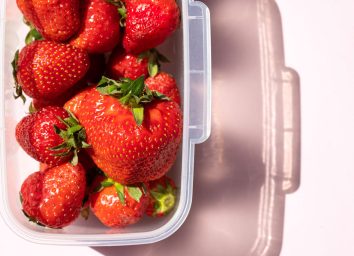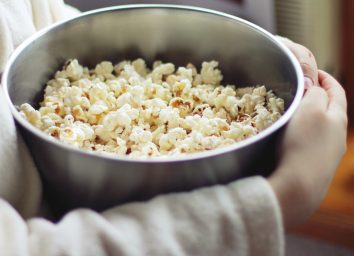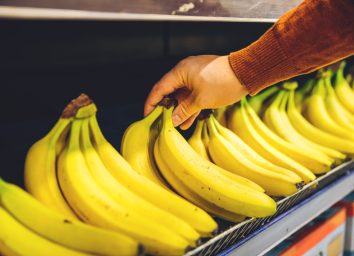22 Best and Worst Foods for Stress
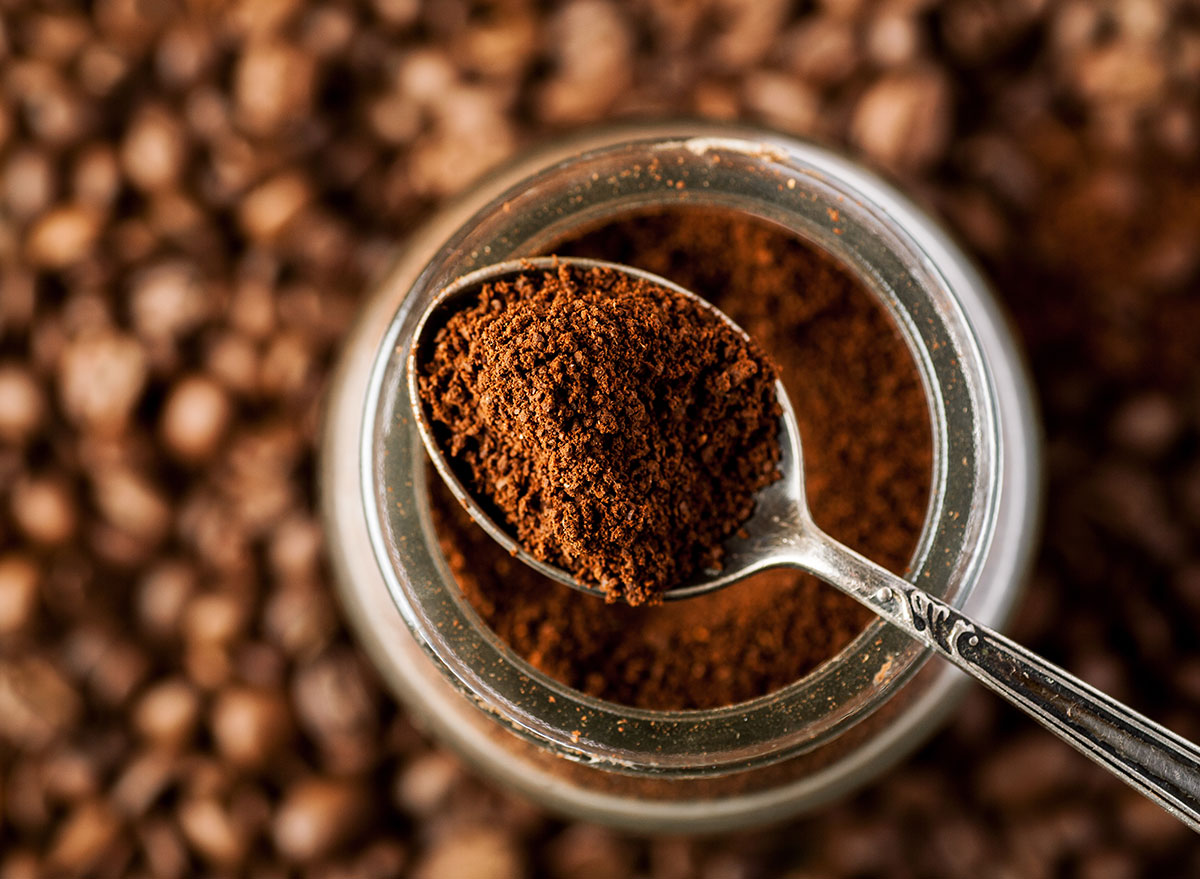
Although you tend to eat well and exercise often, are you finding that you still can’t seem to shake off the weight? Look to your stress triggers. A poor diet, busy life, and a demanding job can contribute to chronic stress levels, which can prevent you from losing weight—and may even add on the pounds. So what’s the connection between stress and your muffin top?
Here’s the deal: Back when humans had to evade predators, we developed a fight-or-flight response to help alert our body to a danger. When we’re stressed—whether it’s because we’re being chased by a mammoth or a fast-approaching project deadline—our body releases a group of hormones called glucocorticoids, whose job is to replenish the energy supply lost during the stressful encounter by revving sugar cravings and increasing fat stores. That way, your body ensures it has enough energy in case another lion crosses your path.
As a result, you get really hungry, really quickly. And you end up craving sweet and high-fat foods which both stimulate the brain to release pleasure hormones to reduce tension as well as provide a quick jolt of replenishing energy. The nail in the coffin? These high-calorie, high-fat foods not only contribute to overeating and subsequent weight gain, but they can even make your stress even worse.
While adding certain foods to your plate may actually exacerbate difficult-to-manage emotions, other foods will help you pull through with ease—without sacrificing your waistline in the process. Read on to learn what science-backed, stress-relieving, natural foods you can use to nourish your body and banish those feelings of frustration and which ones you should keep far away. Stash some of them in your snack drawer alongside these high protein snacks so you can jump over emotional hurdles with ease and get back to life refocused, refueled, and less overwhelmed.
First…The Worst

Avoid these stress-triggering foods so you don’t exacerbate your nerves to the point of a mini meltdown.
Ice Cream
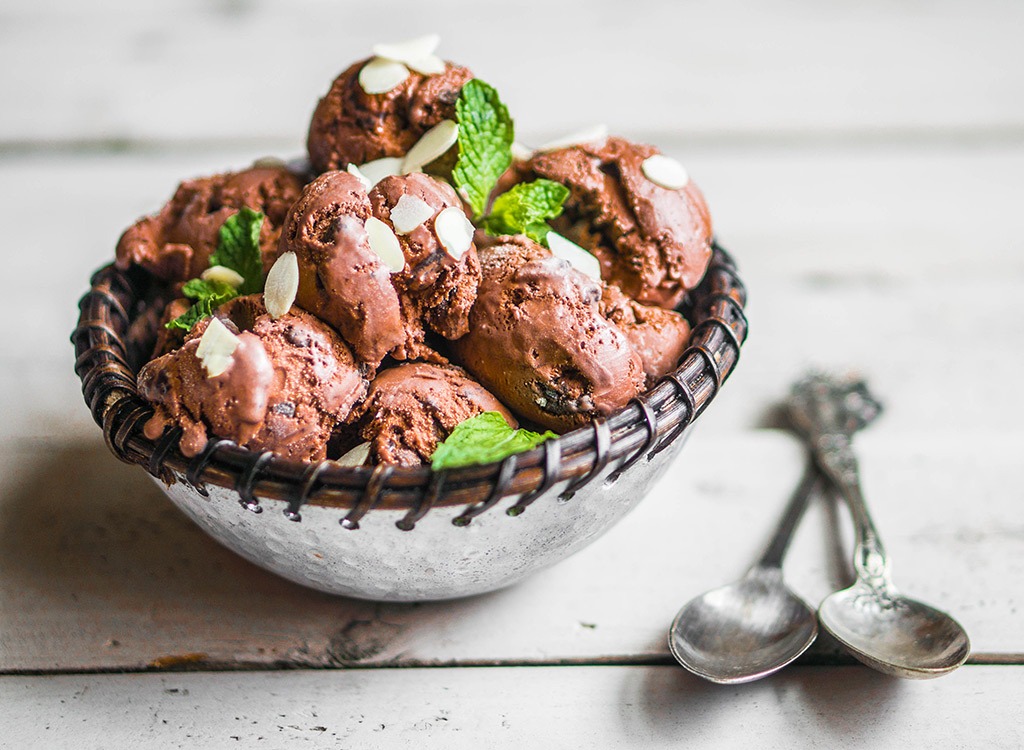
It might cool off your mouth, but delving into a pint of ice cream won’t cool off your mind. In fact, foods that are high in refined sugar only increase stress hormones, including cortisol. That’s because your body can’t use up all that refined sugar (unless you’re in the middle of or recovering from an intense sweat sesh), so your blood glucose levels plummet rapidly. Via the “glucose counter-regulatory response“, your brain perceives low blood-glucose levels as a life-threatening situation and secretes more cortisol to trigger hunger yet again, which in turn, causes you to continue to feel stressed.
Coffee

You might think that a focus-inducing coffee could help distract you from the stress of a looming project deadline, but not all cups are equal. While caffeine is known to be a mood-booster (and may lower your risk of depression) by stimulating dopamine activity, this chemical compound can also blunt the absorption of key mood-balancing nutrients like vitamin D and the B vitamins. What’s worse is when you add a few spoonfuls of sugar to your java, which can cause a post-sugar crash soon after you finish your mug, leaving you hungry, searching for sugar, and with more cortisol.
Chinese Take-Out

When your body switches into fight-or-flight mode during times of stress, one of the responses is to elevate your blood pressure. If you’re constantly shoveling high-sodium foods into your face, you may actually exacerbate your body’s stress response as well as worsen your body’s regulation of blood pressure, resulting in general high blood pressure or hypertension. Chinese food is one of the worst offenders of sodium-laden fare (think: teriyaki sauce and soy sauce). In fact, the gluten-free pad thai from P.F. Chang packs a whopping 5,000 mg of the stuff! Be weary of what you order on those late nights at the office when you’re grinding to finish a project due at 8 A.M. the next morning. Use our guide, Eat This, Not That! For Takeout Addicts for help.
Pretzels
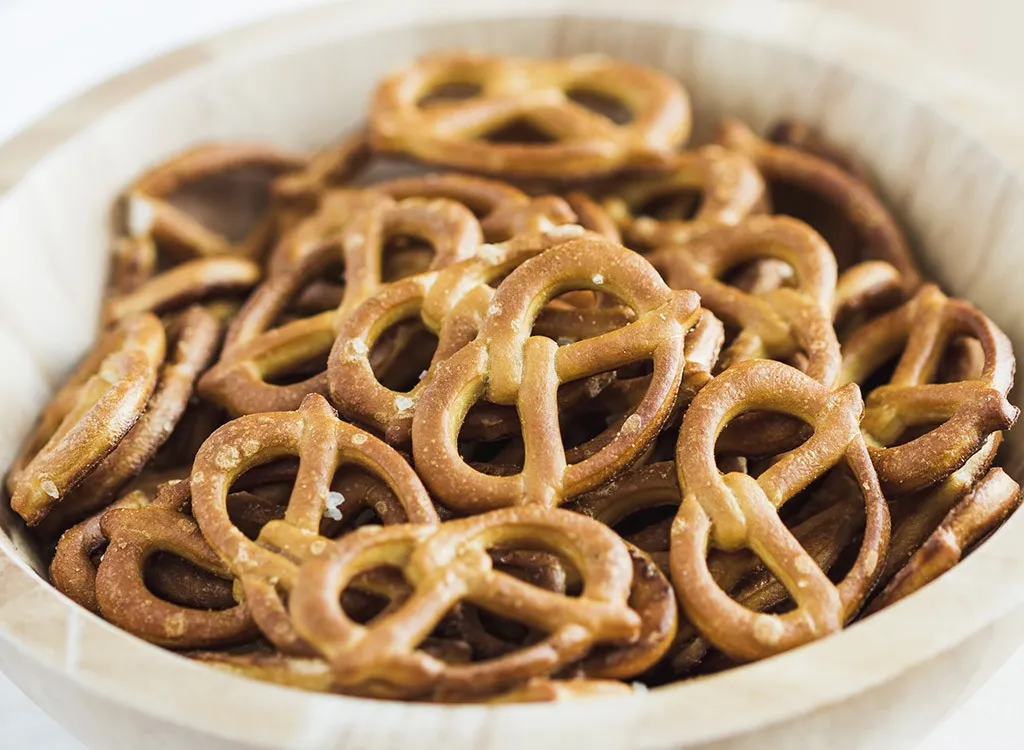
These baked twists are a double-edged sword. Not only will their high sodium levels bolster your blood pressure, but their fast-digesting, refined carbs can actually increase anxiety. That’s because, without the digestion-slowing fiber typically found in whole-grain, complex carbs, pretzels made from simple carbs will spike glucose levels—which then raises the stress hormone cortisol. Beyond their satisfying crunch, pretzels are quick-digesting carbs that only briefly lift mood before sending it (along with your satiety) back to low levels.
Canned Soup
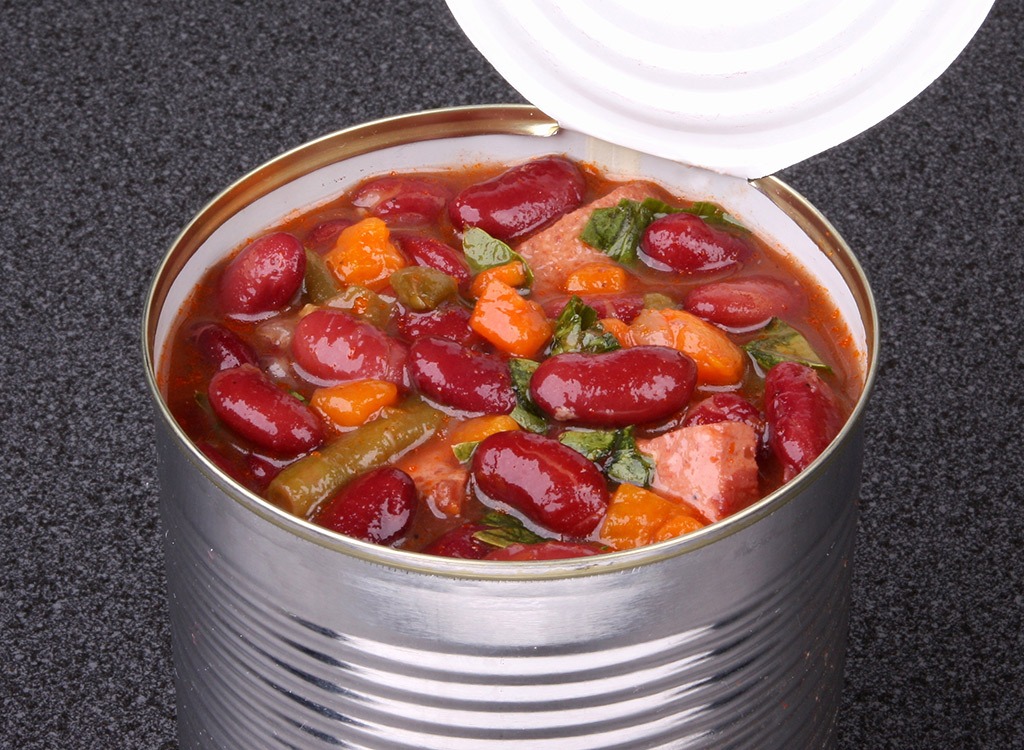
Sure it’s convenient and fast—what we typically look for when it comes to satisfying those stress cravings—but avoid this vehicle of food at all costs. Bisphenol A (BPA) is an endocrine-disrupting, hormone-mimicking chemical used in most canned food liners and plastic containers which can throw off important mood-stabilizing neurotransmitters by significantly altering genes in the stress-mediating portion of the brain, according to research. (It can also skew your genes toward obesity.) One study out of the University of California–Berkeley even found that children exposed to BPA in early childhood were more likely to have anxiety issues.
Pressed Juices
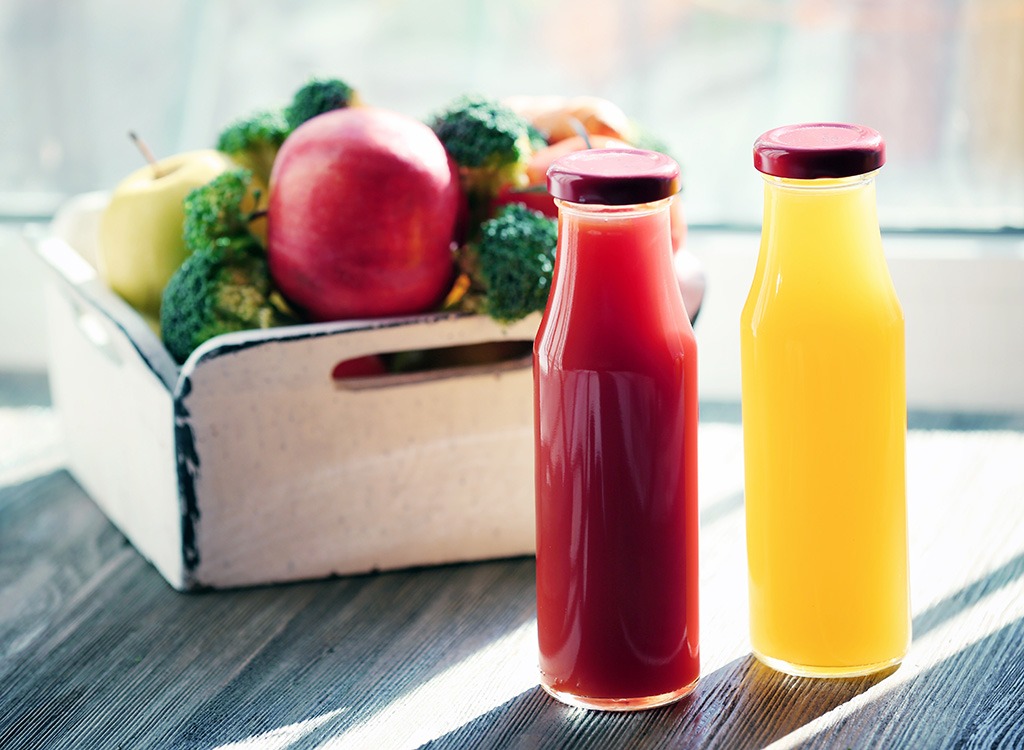
Overturning your anxious mood with a healthy option is a good idea, but don’t grab a freshly pressed juice. Shocker, right? But hear us out. Unlike whole fruits, juices are devoid of slow-digesting fiber and loaded with both glucose and fructose. The result is a blood sugar spike from the glucose that triggers a rush of the stress hormone adrenaline, and the fructose can alter how the brain responds to stress on a genetic level, according to a recent study. As a general rule, avoid all juices—even those naturally sweetened with fruit. If water is boring to you, then try one of these detox waters instead!
Tofu
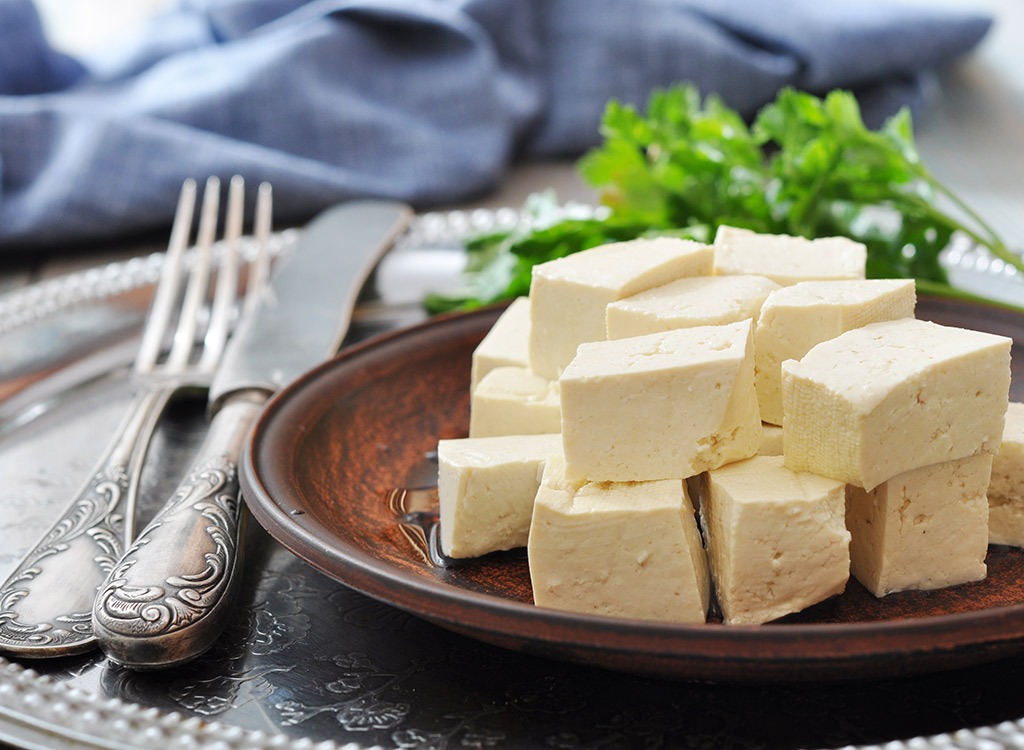
Soy is a triple threat when it comes to stress. For starters, because over 90 percent of soy products in America are GMO, most soy-based products you eat will be treated with glyphosate, an herbicide shown to cause nutrient deficiencies, especially in mood-stabilizing minerals. Add that to soy’s high levels of anti-nutrient phytic acid, which can’t be diminished by traditional soaking and sprouting methods—only through fermentation can these levels be decreased. Lastly, soy is also high in copper, a mineral linked to anxious behavior. If you must eat soy, stick to fermented varieties like tempeh and miso, which are easier to digest.
Wheat Bran
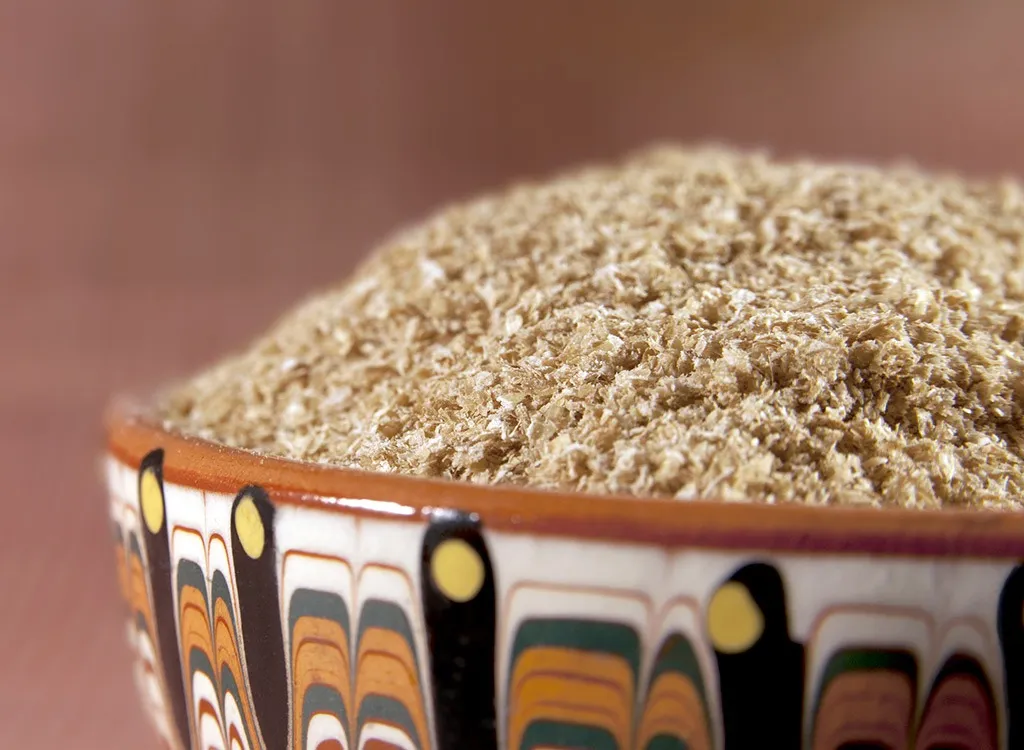
It may be touted by health experts for its impressive fiber content, but wheat bran gets a black mark in the anti-anxiety department for its high concentration of phytic acid. This anti-nutrient binds to important mood minerals like zinc and magnesium, limiting their absorption. Soaking and sprouting can help reduce levels of phytic acid, which is found primarily in whole grains and dried beans; so make the extra step a staple of your kitchen when prepping these foods.
Red Wine

Wine-ing down with alcohol may only wind you up more. While a glass of vino or whiskey on the rocks may feel like it initially helps to calm an anxious mind, research suggests the happy hour strategy may backfire long-term. A few drinks before bed can cause sleep problems, blood sugar swings, and dehydration—all things which can increase stress hormones even more.
Diet Soda

That pop! of the soda can might be enough to quell your stress levels, but stop there. Aspartame, an artificial sweetener that’s found in many diet sodas, has been found to block the production of the neurotransmitter serotonin. This can cause all manner of neuro maladies including headaches, insomnia, changes in mood—and yes, even stress. It’s not just aspartame, either; look out for NutraSweet and Equal as well to protect your mental well-being. Find out more about these sugar alternatives in Every Popular Added Sweetener—Ranked!.
And Now…The Best

There are a number of healthy options that have been scientifically proven to alter brain chemistry and hormones to help your body deal with stress more easily. Reach for one of these picks when a stress-induced craving hits, and fit them into your diet in general to both improve your mood and waistline.
Spinach
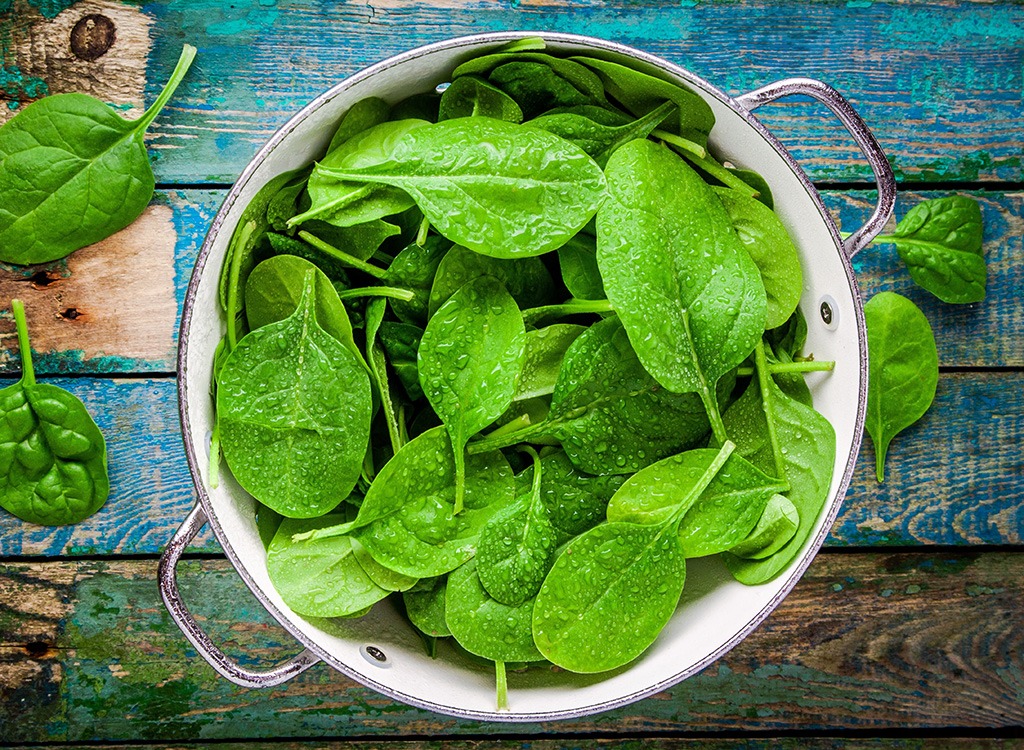
If you’ve been holding your palms on your temples all too often, you might be coming up short on certain nutrients. Research suggests that folic acid deficiency can suppress the production of S-adenosylmethionine, a naturally occurring compound that helps produce serotonin and dopamine. Compounded with the fact that when you’re chronically stressed, your brain begins to produce excess stress hormones like adrenaline and cortisol, and fewer neurotransmitters associated with relaxation and happiness, like dopamine and serotonin, you’ve got a problem. Luckily, scientists believe that improving folic acid status can help reinstate happy hormone levels. To reap the benefits, whip up a three-cup spinach salad and you’ll reach nearly half of the daily recommended intake of folate for both men and women. For more sources of folate, try beans, chickpeas, lentils, asparagus, avocado, or broccoli.
Olive Oil
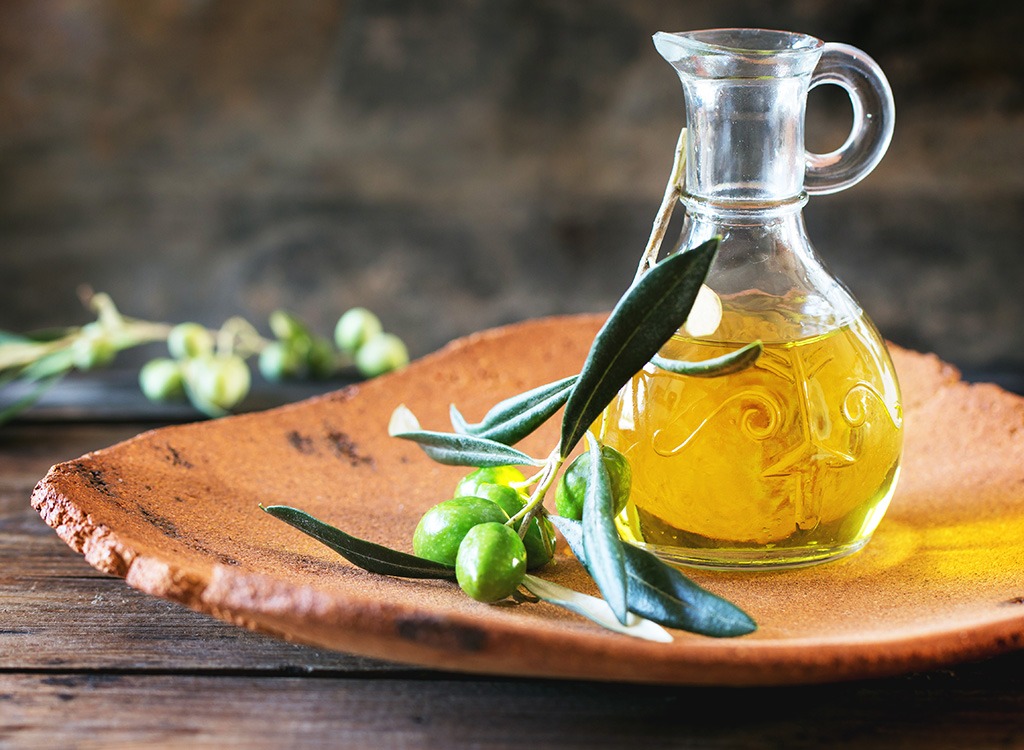
Counteract that stress-induced rise in blood pressure with an olive-oil drizzled salad. A report by UC Davis found that just two tablespoons a day could significantly decrease systolic blood pressure in as little as three weeks. A separate study found that people who ate olive oil daily enjoyed a bigger boost of the happy hormone serotonin than those eating other types of fat. Researchers speculate the benefits are from EVOO’s minimal processing, which leaves higher levels of health-promoting phenols. In case you didn’t know, phenolic content diminishes with time, and particularly when exposed to heat and light, so EVOO should be stored in a cool dark place and used within a couple months of opening a container—not left out on your counter. Find out what other foods you’re eating wrong and missing out on important nutrients!
Oats
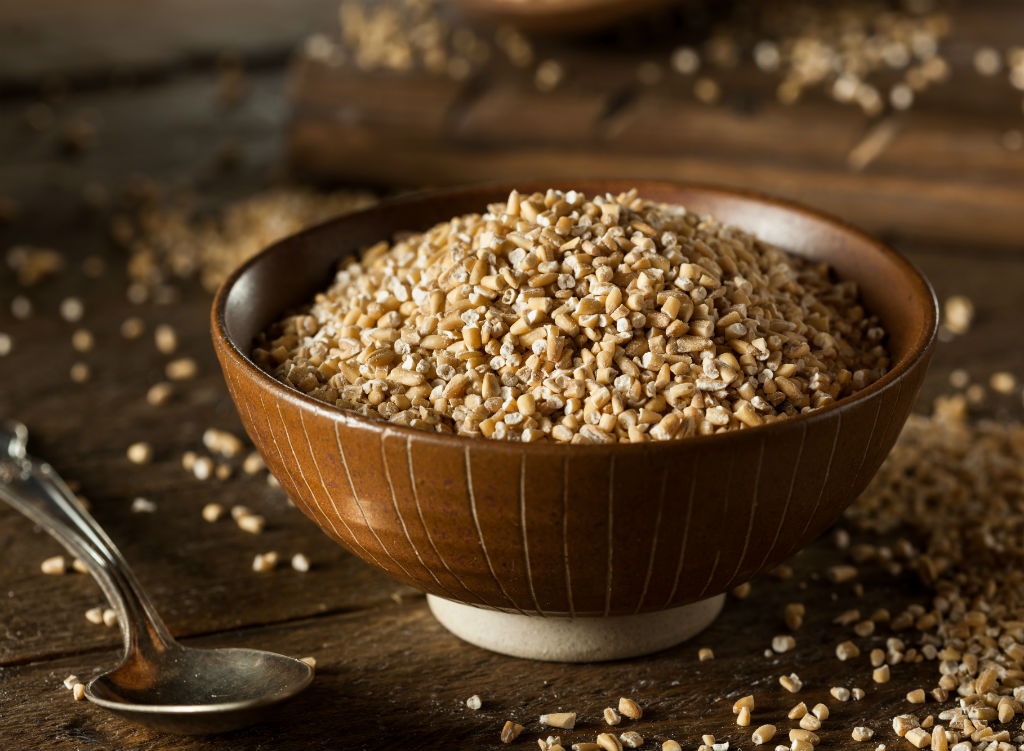
When you’re stressed out, the all-important, mood-regulating neurotransmitter known as serotonin takes a hit. And when you find out that carbs play a role in helping the serotonin building blocks cross into your brain where they can be assembled into the feel-good hormone, you realize that your stress-induced carb craving makes sense. But the key to satisfying those cravings is reaching for slow-digesting, complex carbs like whole grains to promote stable blood sugar levels rather than the refined carbs that cause spikes and dips. Steel cut oats are closest to whole-grain status and also provide a source of tryptophan, the amino acid precursor to serotonin. Plus, the vitamin B6 found in oats is important to keep your brain focused and energized to keep you from feeling like shirking away to cool off from your rage with a nap. Get the most out of your meal by pairing your overnight oats with the mood-boosting nutrients found in nuts or eggs.
Wild Salmon
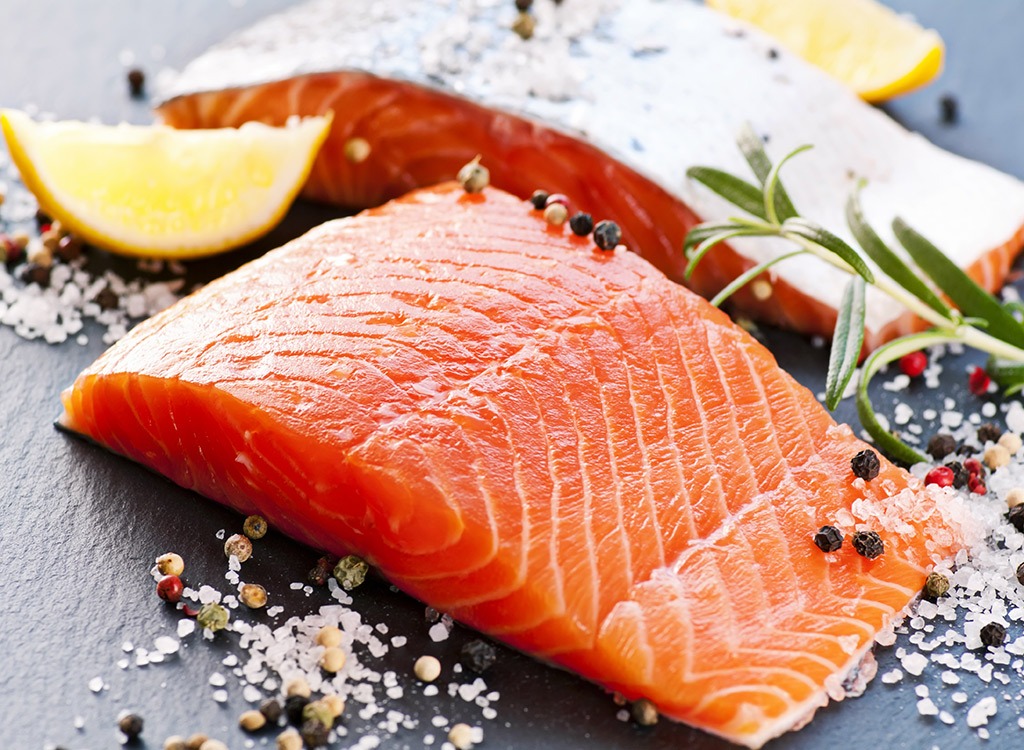
Regularly consuming fatty fish like salmon and tuna will help you boost your mood. These fish are loaded with omega-3s, a mood-boosting fatty acid that may make it easier for serotonin—a chemical that makes you feel happier—to pass through cell membranes and multiply. An added benefit? This fatty acid can help decrease inflammation, a common side effect of chronic stress.
Strawberries

These bright fruits are not only one of the top high fiber foods, they’re also packed with vitamin C (ounce-for-ounce even more than oranges), an antioxidant which has been proven to help people cope with stressful situations. According to one study, levels of cortisol (one of the hormones produced during stress) decreased rapidly in subjects given vitamin C supplement, and the blood pressure of the study participants returned to normal more quickly in the vitamin C group than in the control group.
Rooibos Tea

Sick of being crabby? Forget the happy hour cocktail and steep yourself a cup of rooibos tea instead. The red brew is rich in a powerful flavanoid called aspalathin. Researchers say this fat-fighting compound reduces levels of stress hormones (which trigger hunger and fat storage) and can even inhibit adipogenesis—the formation of new fat cells—by as much as 22 percent. Sounds like more than enough of a reason to sip a cup!
Dark Chocolate

Yes, really! But the key word is dark. Milk and white chocolate are full of sugar (which would only pull you down and make you frown) and contain fewer cocoa solids, the ingredient full of antioxidants which researchers have found can help stimulate the euphoria-inducing chemicals that real chocolate does, especially serotonin, working to buffer the effects of stress. Make sure to grab a bar that’s higher than 70 percent cacao—our guide to the Best and Worst Chocolates should help.
Red Peppers
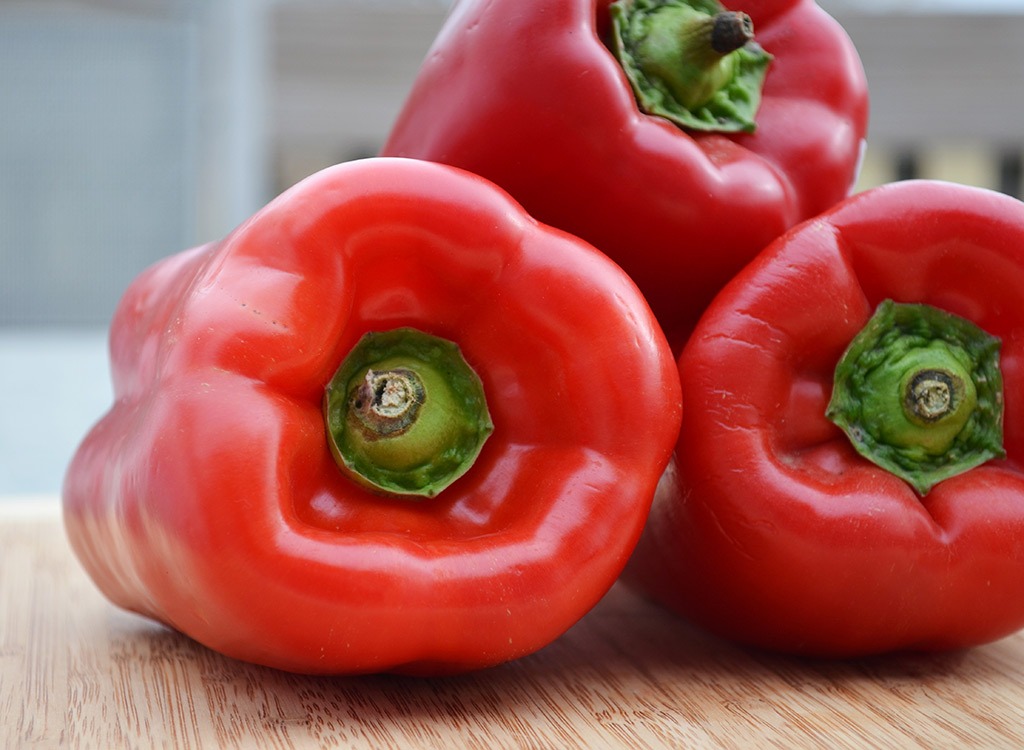
We know polishing off a sleeve of cookies might feel like the best option after a rough day, but you’re better off crunching on a red pepper. That’s because red peppers boast the highest amount of vitamin C in the produce aisle—just one cup has over three times the recommended daily intake of the nutrient! Though you might know it as the immune vitamin, the antioxidant properties of vitamin C also fights off free radicals and lingering stress hormones. Snack on slices raw dipped in hummus or add the veggie to a stir-fry to reap the benefits.
Nuts
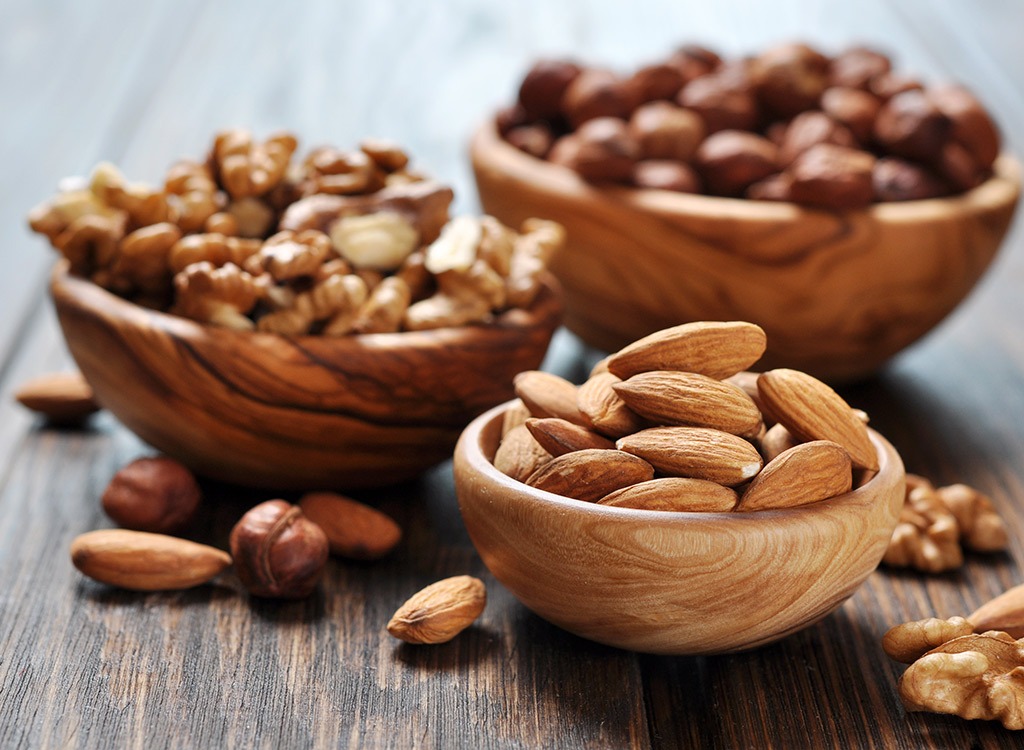
Switch those crunchy chips for nuts to curb your munchies and relieve stress. Most nuts (two standouts are pumpkin seeds and almonds) are high in magnesium—a vital nutrient for our body’s natural stress coping mechanism that the average American isn’t getting enough of. Common symptoms of a magnesium deficiency are an inability to manage stress and the physical ramifications of that like high blood pressure, insomnia, fatigue, or loss of appetite. What’s more, nuts are also rich in mood-boosting selenium; the amino-acid, serotonin-precursor tryptophan; and depression-relieving omega 3 fatty acids. So we’re giving you the go-ahead for that PB&J.
Eggs
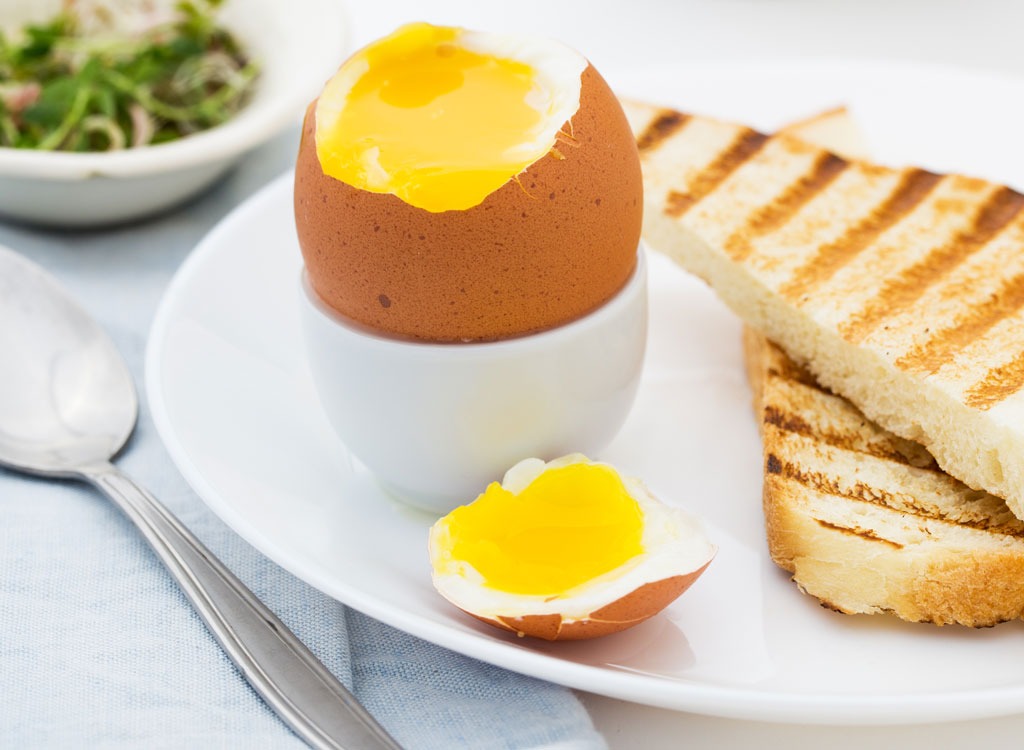
Feeling a bit tense after a fall out with a friend? Take out your angst by cracking some vitamin-D-rich eggs and boost your mood in the process. (FYI, a three-egg omelet will serve up over a third of your daily recommended intake of the nutrient.) Exactly how the sunshine vitamin works to improve mood isn’t yet fully understood, but one theory is that the nutrient increases levels of feel-good hormones, serotonin and dopamine, in the brain. (Plus, eggs are full of tryptophan, an amino acid needed for serotonin production.) Another way these protein-rich foods pack a de-stressing punch? The slow-digesting protein and fat will stabilize blood sugar levels post stressful situation. Pair your eggs with a piece of whole-grain bread to increase levels of serotonin further as carbs are necessary to facilitate the entrance of tryptophan into the brain.
Low-Fat Plain Yogurt
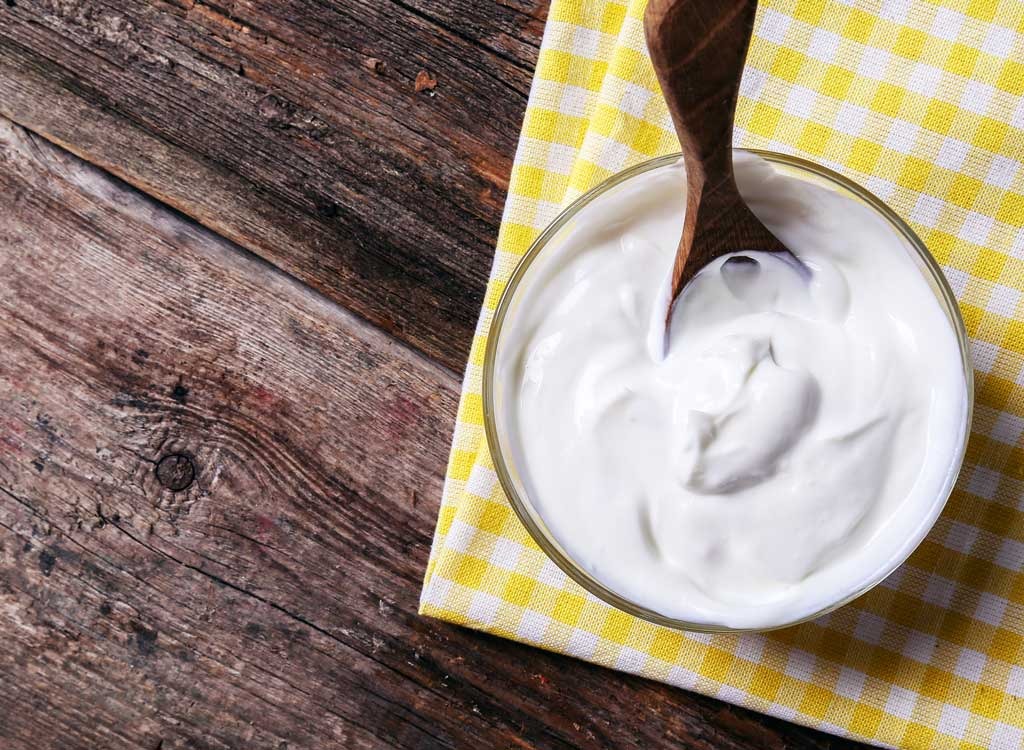
Next time you’re pulling your hair out, grab a cup of plain yogurt. This breakfast staple serves up a hefty dose of lysine and arginine, two amino acids that a study published in the journal Biomedical Research found work together to decrease feelings of anxiety and stress hormone levels. For an added punch, grab a container that has “live active cultures,” which signifies the presence of probiotics. Studies have found that proper gut health plays a critical role in influencing emotions such as anxiety, depression, and stress through our “gut-brain axis.” In fact, a small study by UCLA researchers found an association between consumption of probiotic yogurt and reduction in stress hormone level elevation following an emotional task.
Black Tea
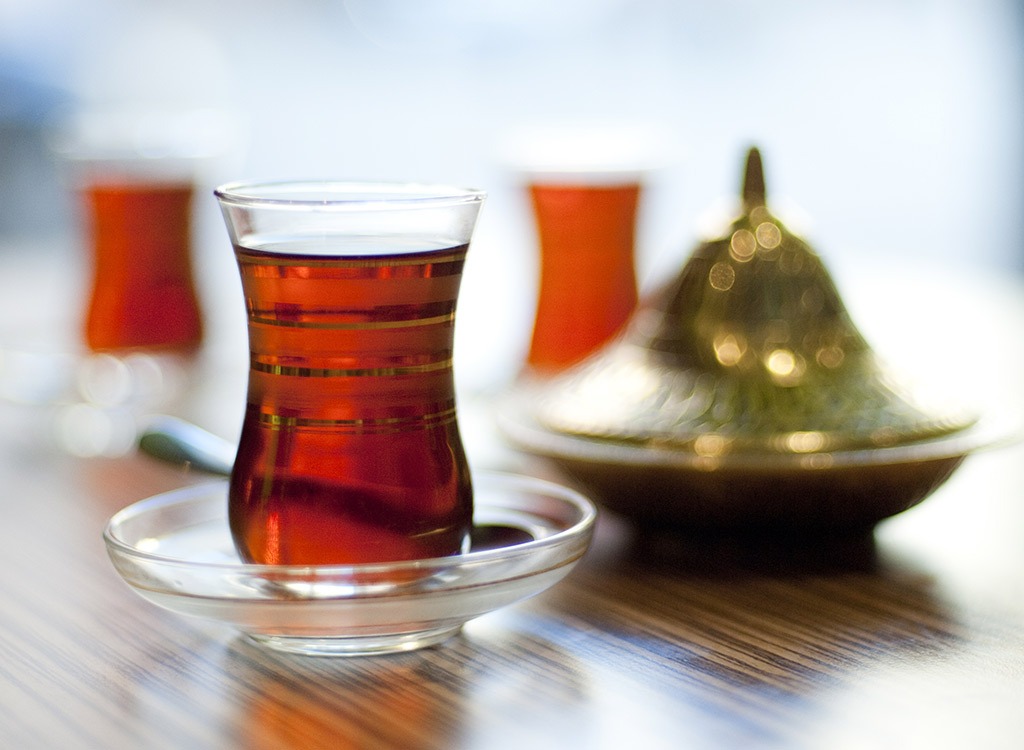
Switch your black cuppa joe for the tea variety to ease your mind. A double-blind, placebo-controlled study published in the journal Psychopharmacology found that those who drank black tea were better able to manage stress than their herbal-sipping counterparts. Not only did black tea drinkers have lower levels of cortisol, their bodies were also able to lower stress hormone levels back to normal and relax more quickly after a nail-biting situation than non-black tea drinkers. Researchers speculate that ingredients such as catechins, polyphenols, and flavonoids in tea leaves may be at play, as they have previously been found to affect neurotransmitters in the brain. Be sure to steep your own cup at home—and avoid these antioxidant-deficient 26 Absolute Worst Bottled Teas in America.
